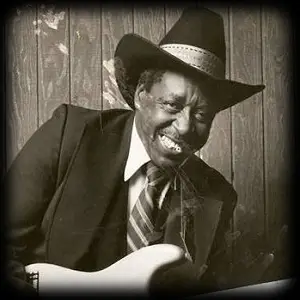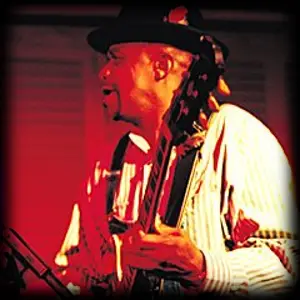 Firstly, there are TWO Smokey Smothers! Like the case of Sonny Boy Williamson, two men were playing the same instrument, and using the same name at the same time, but this time it was in the same town, and sometimes they even played in the same band! We will call them Big Smokey and Little Smokey to ease the confusion. Otis Smothers and his younger brother Albert Abraham ‘Abe’ Smothers were both guitarists from the Mississippi Delta who made it on the Chicago club scene in the 50s, and both produced great albums under the name Smokey Smothers. They should not be confused, of course, with the folk singing comedy duo The Smothers Brothers, who had a big TV show in the 60s.
Firstly, there are TWO Smokey Smothers! Like the case of Sonny Boy Williamson, two men were playing the same instrument, and using the same name at the same time, but this time it was in the same town, and sometimes they even played in the same band! We will call them Big Smokey and Little Smokey to ease the confusion. Otis Smothers and his younger brother Albert Abraham ‘Abe’ Smothers were both guitarists from the Mississippi Delta who made it on the Chicago club scene in the 50s, and both produced great albums under the name Smokey Smothers. They should not be confused, of course, with the folk singing comedy duo The Smothers Brothers, who had a big TV show in the 60s.
Otis ‘Big Smokey’ Smothers was born in Lexington MS in 1929, and he learned guitar and harp from his aunt as a kid. At the end of WWII, he relocated to Chicago, and after the teenager played the club scene for a while, alongside emerging talents like
Earl Hooker and
Bo Diddley, he was picked up by
Howlin’ Wolf, who used him as a ‘second’ guitarist. Smokey’s work on Wolf’s late 50s Chess recordings got him noticed by
King/Federal Records and they released a couple of his singles. Recruiting
Freddie King on lead guitar, Smokey then recorded a great album, ‘Back Porch Blues’ for Federal in 1962.
Big Smokey plays his ‘Blind & Dumb Man Blues’;

Meanwhile, young Abe Smothers, ten years his junior, stepped into his brother’s shoes in Wolf’s band as ‘Little Smokey’, and played with West-side stars like
Magic Sam and
Otis Rush. In the early 60s, a kid called
Paul Butterfield was haunting the Chicago clubs, and Little Smokey played guitar alongside Elvin Bishop in early versions of their band. Little Smokey did not feature on their 1965 breakthrough album, but he and Elvin remained life-long friends. Work with
Buddy Guy,
James Cotton and Earl Hooker kept Little Smokey busy in the 60s, but he then dropped out of the music scene for a decade.
Little Smokey and Elvin Bishop play ‘Days are Dark’ from ‘Bossman’;
Big Smokey was also kept busy in the 60s as part of The
Muddy Waters ‘Junior Band’, which held down Muddy’s residency spots in Chicago when he was on tour. It was also a training school for moving up into Muddy’s main band, and Big Smokey and harp player Mojo Buford made that move. His place in Muddy’s band was only part-time, but Smokey could write a Blues too, and Muddy recorded several of his songs including ‘Ain’t Gonna Be No Monkey Man’ and ‘Can’t Judge Nobody’. This raised Smokey’s profile enough to have the Red Beans label issue his solo single ‘Got My Eyes on You’ in 1968. Big Smokey remained a fixture on the Chicago club scene for many years until ill-health slowed him down, and heart problems ended his life in 1993.
Smokey Smothers Discography
Young Freddie King plays lead guitar on Smokey’s brilliant debut album, expanded to 25 tracks with unreleased material and a few alternate takes.
BACKPORCH BLUES
Little Smokey came out of retirement in 1979 to play on Mojo Buford’s album ‘Chicago Blues Summit’, and he spent most of the 80s as part of The Legendary Blues Band. In 1993, Little Smokey recorded his spectacular ‘Bossman’ album, with his cousin
Lee ‘Shot’ Williams on vocals and his old friend Elvin Bishop on guitar. Little Smokey and Elvin became a double-act at many Blues Festivals, and
Alligator Records released their live album ‘That’s My Partner’ in 2000. Heart problems and diabetes laid Little Smokey low, and Elvin compiled an album of their work together as ‘Chicago Blues Buddies’ to help with medical costs, but sadly Abe ‘Little Smokey’ Smothers passed away in 2010.
 Firstly, there are TWO Smokey Smothers! Like the case of Sonny Boy Williamson, two men were playing the same instrument, and using the same name at the same time, but this time it was in the same town, and sometimes they even played in the same band! We will call them Big Smokey and Little Smokey to ease the confusion. Otis Smothers and his younger brother Albert Abraham ‘Abe’ Smothers were both guitarists from the Mississippi Delta who made it on the Chicago club scene in the 50s, and both produced great albums under the name Smokey Smothers. They should not be confused, of course, with the folk singing comedy duo The Smothers Brothers, who had a big TV show in the 60s.
Firstly, there are TWO Smokey Smothers! Like the case of Sonny Boy Williamson, two men were playing the same instrument, and using the same name at the same time, but this time it was in the same town, and sometimes they even played in the same band! We will call them Big Smokey and Little Smokey to ease the confusion. Otis Smothers and his younger brother Albert Abraham ‘Abe’ Smothers were both guitarists from the Mississippi Delta who made it on the Chicago club scene in the 50s, and both produced great albums under the name Smokey Smothers. They should not be confused, of course, with the folk singing comedy duo The Smothers Brothers, who had a big TV show in the 60s. Meanwhile, young Abe Smothers, ten years his junior, stepped into his brother’s shoes in Wolf’s band as ‘Little Smokey’, and played with West-side stars like Magic Sam and Otis Rush. In the early 60s, a kid called Paul Butterfield was haunting the Chicago clubs, and Little Smokey played guitar alongside Elvin Bishop in early versions of their band. Little Smokey did not feature on their 1965 breakthrough album, but he and Elvin remained life-long friends. Work with Buddy Guy, James Cotton and Earl Hooker kept Little Smokey busy in the 60s, but he then dropped out of the music scene for a decade.
Meanwhile, young Abe Smothers, ten years his junior, stepped into his brother’s shoes in Wolf’s band as ‘Little Smokey’, and played with West-side stars like Magic Sam and Otis Rush. In the early 60s, a kid called Paul Butterfield was haunting the Chicago clubs, and Little Smokey played guitar alongside Elvin Bishop in early versions of their band. Little Smokey did not feature on their 1965 breakthrough album, but he and Elvin remained life-long friends. Work with Buddy Guy, James Cotton and Earl Hooker kept Little Smokey busy in the 60s, but he then dropped out of the music scene for a decade.